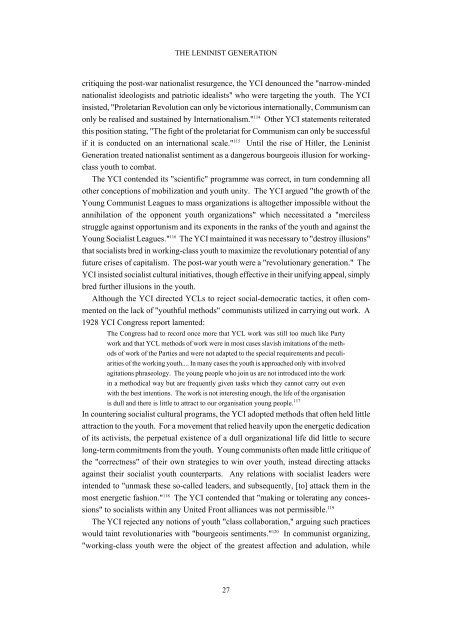Joel A Lewis Youth Against Fascism.pdf
Joel A Lewis Youth Against Fascism.pdf
Joel A Lewis Youth Against Fascism.pdf
Create successful ePaper yourself
Turn your PDF publications into a flip-book with our unique Google optimized e-Paper software.
THE LENINIST GENERATION<br />
critiquing the post-war nationalist resurgence, the YCI denounced the "narrow-minded<br />
nationalist ideologists and patriotic idealists" who were targeting the youth. The YCI<br />
insisted, "Proletarian Revolution can only be victorious internationally, Communism can<br />
only be realised and sustained by Internationalism." 114 Other YCI statements reiterated<br />
this position stating, "The fight of the proletariat for Communism can only be successful<br />
if it is conducted on an international scale." 115 Until the rise of Hitler, the Leninist<br />
Generation treated nationalist sentiment as a dangerous bourgeois illusion for workingclass<br />
youth to combat.<br />
The YCI contended its "scientific" programme was correct, in turn condemning all<br />
other conceptions of mobilization and youth unity. The YCI argued "the growth of the<br />
Young Communist Leagues to mass organizations is altogether impossible without the<br />
annihilation of the opponent youth organizations" which necessitated a "merciless<br />
struggle against opportunism and its exponents in the ranks of the youth and against the<br />
Young Socialist Leagues." 116 The YCI maintained it was necessary to "destroy illusions"<br />
that socialists bred in working-class youth to maximize the revolutionary potential of any<br />
future crises of capitalism. The post-war youth were a "revolutionary generation." The<br />
YCI insisted socialist cultural initiatives, though effective in their unifying appeal, simply<br />
bred further illusions in the youth.<br />
Although the YCI directed YCLs to reject social-democratic tactics, it often commented<br />
on the lack of "youthful methods" communists utilized in carrying out work. A<br />
1928 YCI Congress report lamented:<br />
The Congress had to record once more that YCL work was still too much like Party<br />
work and that YCL methods of work were in most cases slavish imitations of the methods<br />
of work of the Parties and were not adapted to the special requirements and peculiarities<br />
of the working youth.... In many cases the youth is approached only with involved<br />
agitations phraseology. The young people who join us are not introduced into the work<br />
in a methodical way but are frequently given tasks which they cannot carry out even<br />
with the best intentions. The work is not interesting enough, the life of the organisation<br />
is dull and there is little to attract to our organisation young people. 117<br />
In countering socialist cultural programs, the YCI adopted methods that often held little<br />
attraction to the youth. For a movement that relied heavily upon the energetic dedication<br />
of its activists, the perpetual existence of a dull organizational life did little to secure<br />
long-term commitments from the youth. Young communists often made little critique of<br />
the "correctness" of their own strategies to win over youth, instead directing attacks<br />
against their socialist youth counterparts. Any relations with socialist leaders were<br />
intended to "unmask these so-called leaders, and subsequently, [to] attack them in the<br />
most energetic fashion." 118 The YCI contended that "making or tolerating any concessions"<br />
to socialists within any United Front alliances was not permissible. 119<br />
The YCI rejected any notions of youth "class collaboration," arguing such practices<br />
would taint revolutionaries with "bourgeois sentiments." 120 In communist organizing,<br />
"working-class youth were the object of the greatest affection and adulation, while<br />
27

















